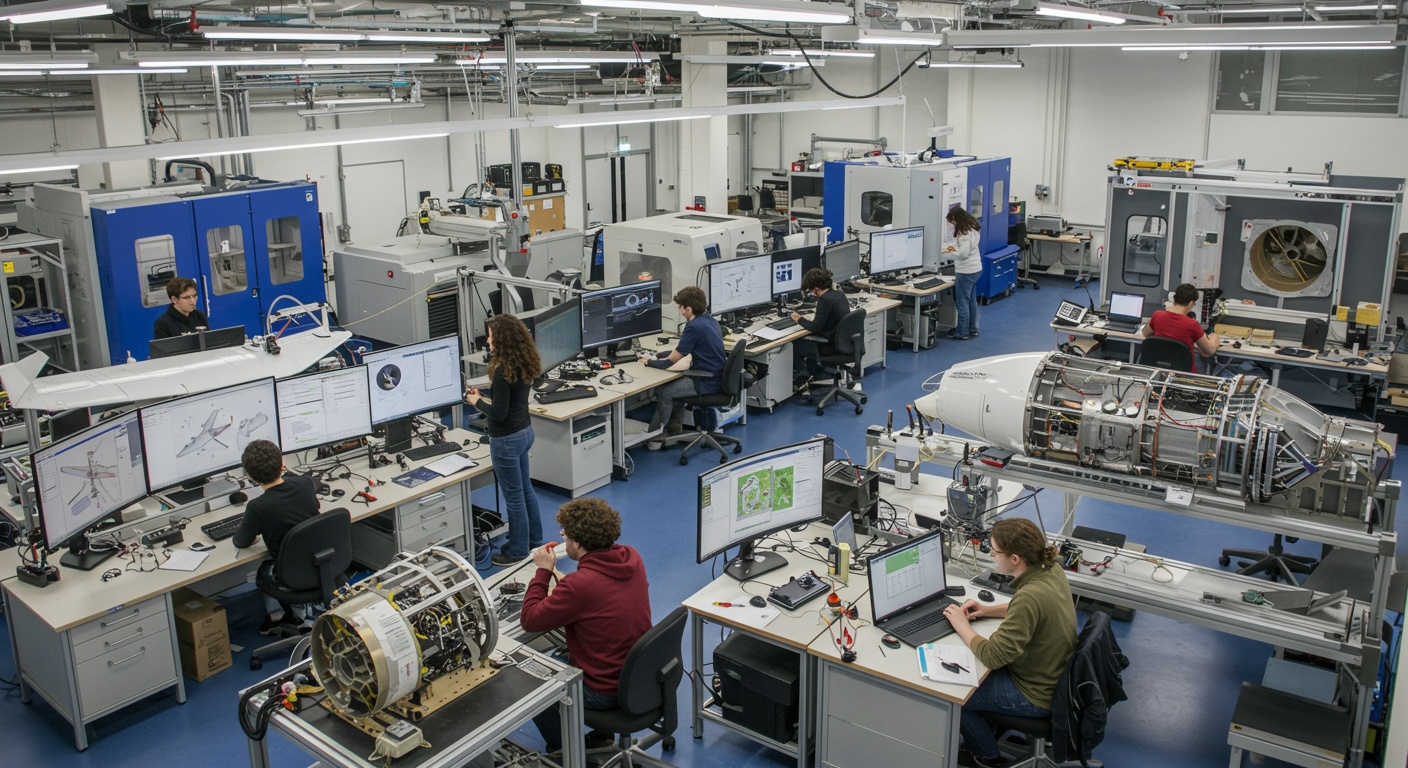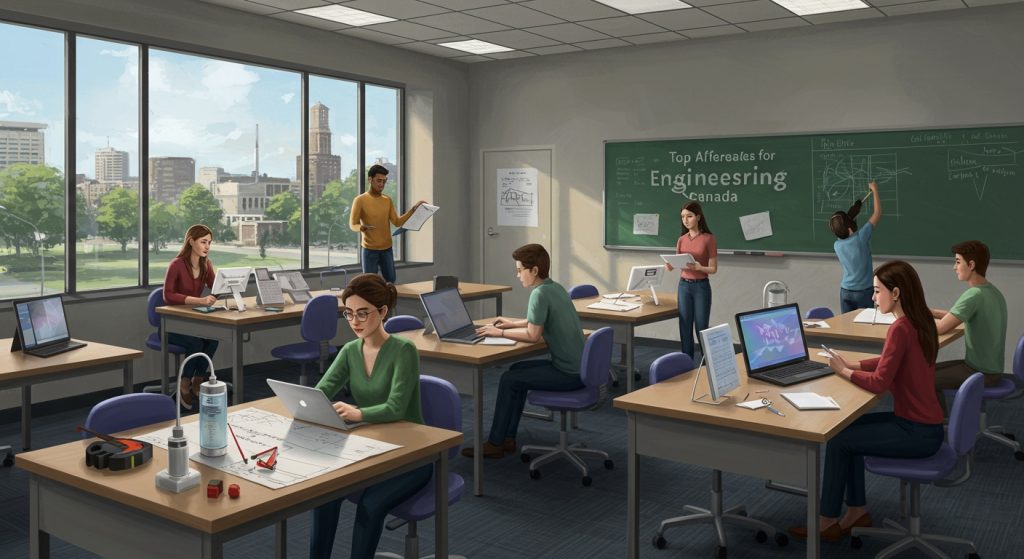France’s engineering heritage, from the Eiffel Tower’s groundbreaking iron lattice to the high-speed TGV, sets the stage for mastering advanced techniques. Today, with a global push for sustainable infrastructure and Industry 4. 0, engineers face unprecedented demands: optimizing resource consumption, designing intelligent systems. Pushing the boundaries of materials science. This program immerses you in these challenges, focusing on finite element analysis for structural optimization, advanced control algorithms for autonomous systems. The latest composite materials for aerospace applications. By exploring case studies from Airbus’s A350 to innovative smart city projects in Lyon, you’ll gain hands-on experience and develop the critical thinking necessary to lead future engineering advancements.

Decoding the Allure of French Engineering Education
France has long been a global leader in innovation, particularly in fields like aerospace, automotive. Energy. This reputation is built upon a foundation of strong technical education, attracting students worldwide. But what exactly makes French Engineering programs so appealing? French Engineering education is characterized by a rigorous, science-based curriculum coupled with a strong emphasis on practical application. Instead of solely focusing on theoretical knowledge, students are immersed in hands-on projects, internships. Collaborations with industry partners. This prepares graduates to immediately contribute to the workforce upon graduation. One key aspect is the “Grande École” system. These prestigious institutions, often highly selective, offer specialized Engineering degrees that are highly regarded both nationally and internationally. They provide a unique learning environment that fosters innovation and leadership.
Navigating the Landscape: Grande Écoles vs. Universities
Choosing the right institution is crucial. In France, the primary options for advanced Engineering studies are the “Grandes Écoles” and public universities. Understanding the differences between these two systems is essential for making an informed decision. Grandes Écoles: These are elite, highly selective institutions that focus on preparing students for leadership roles in specific industries. Admission is typically based on competitive entrance exams after two years of preparatory classes (“classes préparatoires”). The curriculum is more practically oriented, with extensive internships and industry collaborations. Examples include École Polytechnique, CentraleSupélec. Mines ParisTech. Universities: French public universities offer a broader range of academic programs, including Engineering. Admission is generally less competitive than the Grandes Écoles, although Master’s programs may have stricter requirements. The curriculum tends to be more theoretical. Many universities also offer practical training and research opportunities. Examples include Sorbonne University, Université Paris-Saclay. Université Grenoble Alpes.
| Feature | Grandes Écoles | Universities |
|---|---|---|
| Selectivity | Highly Selective (Competitive Entrance Exams) | Less Selective (Admission based on academic record) |
| Curriculum | Practically oriented, Industry focused | More Theoretical, broader academic scope |
| Internships | Extensive, mandatory | Available. Not always mandatory |
| Industry Connections | Strong, direct partnerships | Growing. May vary by program |
| Tuition Fees | Generally higher (but still lower than in the US or UK) | Lower (Publicly funded) |
| Prestige | Generally higher (National and International Recognition) | High. Can vary by university and program |
Key Fields of Study: From Aerospace to AI
France offers a diverse range of Engineering specializations, each with its own strengths and unique opportunities. Here are some of the most prominent fields: Aerospace Engineering: France is a global leader in aerospace, with companies like Airbus and Thales driving innovation in aircraft design, satellite technology. Space exploration. Programs in this field focus on aerodynamics, propulsion, structural analysis. Control systems. Real-world applications include designing fuel-efficient aircraft, developing advanced satellite communication systems. Contributing to space missions. Mechanical Engineering: This is a broad field that encompasses the design, analysis. Manufacturing of mechanical systems. French programs often emphasize advanced materials, robotics. Automation. Applications include developing high-performance engines, designing efficient manufacturing processes. Creating innovative robotic solutions. Electrical Engineering: With a strong focus on power systems, electronics. Telecommunications, this field is crucial for modern infrastructure and technological advancements. Programs often cover topics such as signal processing, control theory. Embedded systems. Real-world applications include developing smart grids, designing advanced communication networks. Creating innovative electronic devices. Civil Engineering: Focused on the design, construction. Maintenance of infrastructure, this field is essential for sustainable development and urban planning. Programs often cover topics such as structural analysis, geotechnical engineering. Transportation planning. Real-world applications include designing bridges, buildings. Transportation systems that are safe, efficient. Environmentally friendly. Computer Science and Artificial Intelligence: France is rapidly emerging as a hub for AI research and development. Programs in this field cover topics such as machine learning, computer vision, natural language processing. Robotics. Applications include developing AI-powered healthcare solutions, creating autonomous vehicles. Building intelligent robots for various industries. Nuclear Engineering: France has a long history of nuclear power generation. Programs in this field focus on reactor design, nuclear safety. Waste management. Applications include developing advanced nuclear reactors, ensuring the safety of nuclear power plants. Managing nuclear waste effectively.
The Power of Internships and Industry Partnerships
A defining characteristic of French Engineering education is the emphasis on practical experience. Internships (“stages” in French) are an integral part of the curriculum, providing students with the opportunity to apply their knowledge in real-world settings. These internships often lead to job offers after graduation. Grandes Écoles, in particular, have strong partnerships with industry leaders, ensuring that the curriculum is aligned with the needs of the job market. These partnerships also facilitate research collaborations and provide students with access to cutting-edge technologies and facilities. For example, a student studying Aerospace Engineering at École Polytechnique might intern at Airbus, working on the design of a new aircraft wing. This experience would not only provide valuable practical skills but also give the student a competitive edge when applying for jobs after graduation. Similarly, a student studying Computer Science at CentraleSupélec might collaborate with Thales on a research project related to AI-powered cybersecurity.
Mastering the Language: French for Engineers
While many Engineering programs in France offer courses in English, learning French is highly recommended for international students. Not only will it enhance your academic experience. It will also improve your job prospects after graduation. Being fluent in French will allow you to communicate effectively with colleagues, participate in industry events. Fully integrate into French society. Many companies also prefer to hire engineers who are proficient in French, even if the official language of the company is English. Fortunately, many language schools and universities offer French language courses specifically designed for international students. Taking advantage of these resources will significantly improve your language skills and make your transition to studying and working in France much smoother.
Funding Your Studies: Scholarships and Financial Aid
Studying abroad can be expensive. There are various funding options available to international students who wish to pursue Engineering studies in France. French Government Scholarships: The French government offers a variety of scholarships to international students through programs like the Eiffel Excellence Scholarship Program. These scholarships are highly competitive but can provide significant financial support. University Scholarships: Many French universities and Grandes Écoles offer scholarships to international students based on academic merit or financial need. Check the websites of the institutions you are interested in for more details. Erasmus+ Program: The Erasmus+ program provides funding for students from EU countries to study in France. Private Scholarships: Several private organizations and foundations offer scholarships to international students pursuing Engineering studies. Research these options carefully and apply for as many scholarships as possible. In addition to scholarships, you may also be able to find part-time work to help cover your living expenses. But, keep in mind that student visa regulations may limit the number of hours you can work per week.
Real-World Impact: Case Studies of French Engineering Excellence
The impact of French Engineering expertise is evident in numerous real-world applications across various industries. Here are a few compelling case studies: Airbus A380: The Airbus A380, the world’s largest passenger aircraft, is a testament to French Engineering prowess. French engineers played a crucial role in the design, development. Manufacturing of this iconic aircraft, pushing the boundaries of aerodynamics, materials science. Manufacturing processes. TGV High-Speed Train: The TGV (Train à Grande Vitesse) is a high-speed train network that connects major cities in France and Europe. French engineers pioneered the development of this technology, setting new standards for speed, safety. Efficiency in rail transportation. Ariane Space Program: The Ariane space program, operated by the European Space Agency (ESA), has launched numerous satellites and spacecraft into orbit. French engineers have been instrumental in the design and development of Ariane rockets, contributing to advancements in space exploration and satellite technology. Smart Grids: France is at the forefront of smart grid technology, developing advanced solutions for managing and distributing electricity more efficiently. French engineers are working on projects that integrate renewable energy sources, improve grid reliability. Reduce energy consumption. These examples demonstrate the significant impact of French Engineering expertise on shaping the world we live in. By pursuing advanced Engineering studies in France, you can become part of this legacy of innovation and contribute to solving some of the world’s most pressing challenges.
Conclusion
France’s finest engineering programs have equipped you with a potent blend of theoretical knowledge and practical skills, positioning you for success in a rapidly evolving global landscape. But knowledge alone isn’t enough. The true differentiator will be your ability to adapt and innovate. Remember the case studies we explored, specifically Renault’s electric vehicle initiatives? They highlight the critical need for engineers to embrace sustainability and integrate it into every design. Looking ahead, the convergence of AI and engineering presents both opportunities and challenges. Consider specializing in areas like autonomous systems or advanced materials to stay ahead of the curve. Don’t hesitate to network actively, attend industry conferences like the “Forum Entreprendre,” and seek mentorship from seasoned professionals. The road ahead demands continuous learning and a commitment to pushing the boundaries of what’s possible. Go forth and build a better future, one innovation at a time!
More Articles
Top Universities in Germany for Mechanical Engineering
Leading Universities for Data Science in Germany
Best Biotechnology Programs in Australia
Top Architecture Schools in Italy for Design Innovation
FAQs
So, ‘France’s Finest: Advanced Engineering Studies’ – what exactly is that?
Essentially, it’s a curated collection of some of the best advanced engineering programs France has to offer. Think of it as a spotlight shining on top-tier Master’s degrees, specialized engineering schools. Research opportunities. It’s designed for students who are serious about diving deep into specific engineering fields.
Okay, cool. But what kind of engineering are we talking about here? Is it just bridges and buildings?
Nope! It’s way broader than that. While civil engineering might be included, you’ll also find programs covering areas like aerospace, mechanical, electrical, computer science engineering. Even more niche fields like bioengineering or sustainable energy. , if it involves really complex problem-solving using scientific principles, chances are it’s in there.
What makes these French engineering programs so special, anyway?
Good question! French engineering education has a long and respected history. They’re known for a strong emphasis on theoretical foundations combined with practical application. Plus, many programs have close ties to industry, meaning you’ll often get opportunities for internships and real-world projects. And let’s be honest, studying in France is a pretty great perk in itself!
What are the admission requirements generally like for these advanced studies?
Typically, you’ll need a solid Bachelor’s degree in a relevant engineering field. Strong grades are essential. Some programs might require specific prerequisite coursework. Also, since you’ll be studying in France, demonstrating proficiency in French, or having a plan to learn it, is often necessary. But don’t panic! Many programs offer courses in English.
Will I need to speak French fluently to get by?
It depends on the program! Some are taught entirely in English. Even then, knowing some French will definitely enhance your experience. Daily life, interacting with locals, even some group projects might require at least a basic understanding. Plus, it’s just polite! Consider taking a French language course before or during your studies.
What about job prospects after graduation? Will a French engineering degree translate well internationally?
Absolutely. A degree from a reputable French engineering institution is highly regarded globally. The rigorous training and international exposure you’ll receive will make you a competitive candidate for jobs in various industries and countries. Plus, the connections you make during your studies can open doors to opportunities you might not have considered otherwise.
Funding! How am I supposed to afford studying engineering in France?
Funding is always a concern, isn’t it? There are a few avenues to explore. Look into scholarships offered by the French government, your home country, or the individual universities. Many programs also offer financial aid or assistantships. Start researching early and be prepared to submit a well-crafted application highlighting your academic achievements and potential.



